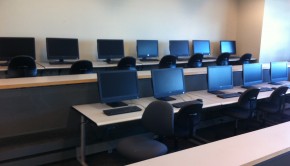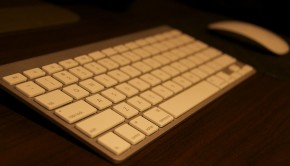
Published on March 17, 2014 | by Rebecca Alberico Photography by Rebecca Alberico
0Text, Toss, Turn, Repeat
“If I can’t fall asleep, I usually play with my phone; go on Twitter and Instagram,” said third-year Guelph-Humber student, Catherine Chen.
Chen said technology before bed soothes her, and is not a vice she is going to give up anytime soon.
The third year university student isn’t alone. According to the National Sleep Foundation, 95 per cent of people surveyed said they used electronic devices prior to sleeping.
When catching some z’s isn’t in the cards, it seems that browsing YouTube videos and hash tag surfing have replaced those old-fashioned lullabies and counting sheep based on the foundation’s poll.
It recognized post-secondary students and young adults aged 19-25 as a group particularly vulnerable to sleep difficulties that can be harmful both physically and mentally.
Additionally, researchers have found that the artificial light from some devices’ screens may decrease the sleep hormone melatonin, lowering the odds of a deep sleep.
According to Psychology Today’s recent article called “Is technology stealing your sleep?,” watching the news, reading articles online and playing video games all keep the brain over stimulated in “active mode,” making it difficult for some people to simply close their eyes and fall asleep.
Consequently, continuous use of technology before bed hinders the brain’s ability to function properly throughout the day.
Low energy, difficulty concentrating and drowsy driving are a few of the side effects.
“If I use my phone before bed, I find that I don’t sleep as well and I’m restless in the morning,” said York University student, Alyssa Romualdi.
“I always need coffee.”
When students are sleep deprived, an intravenous drip of caffeine isn’t the answer, according to Phuong Nguyen, sleep technologist at St. Joseph’s Health Centre. She said it’s important to get to the root of the problem.
“Get used to setting a limit on your use of any technology before bed. Half an hour to an hour before bed is a good time to stop using it, but never bring it to bed,” said Nguyen.
In her 13 years at St. Joseph’s Health Centre, she said the number of young adults visiting the sleep lab has steadily increased.
Prolonged sleep difficulties could result in some serious consequences, incurable by a couple midday siestas.
“Sleep deprivation itself is a harmful side effect of poor sleeping habits. You get memory loss, concentration loss and all these issues have severe impacts on a students’ studies,” said Nguyen.
She recommends making it a habit of getting a consistent amount of sleep each night.
“An ideal night for students would be a 10 or 11 p.m. bedtime, with uninterrupted sleep until morning.”




